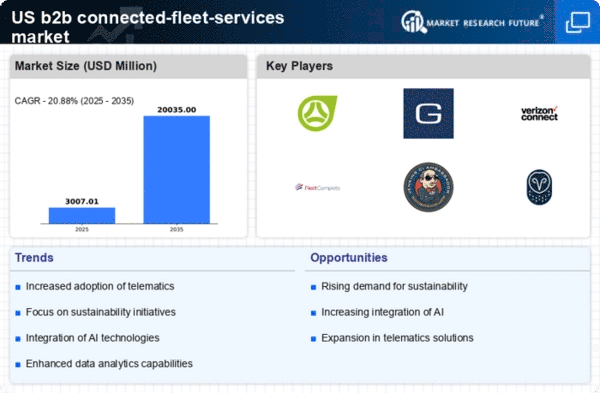Rising Demand for Fleet Efficiency
The b2b connected-fleet-services market is experiencing a notable surge in demand for enhanced fleet efficiency. Businesses are increasingly recognizing the importance of optimizing their fleet operations to reduce costs and improve service delivery. According to recent data, companies that implement connected fleet solutions can achieve up to 20% savings in operational costs. This drive for efficiency is fueled by the need to streamline logistics, minimize downtime, and enhance route planning. As a result, fleet managers are turning to connected services that provide real-time data and insights, enabling them to make informed decisions. The emphasis on efficiency is likely to continue shaping the b2b connected-fleet-services market, as organizations seek to remain competitive in a rapidly evolving landscape.
Increased Investment in Fleet Technology
Investment in fleet technology is a significant driver of growth in the b2b connected-fleet-services market. Companies are allocating substantial budgets to upgrade their fleet management systems and incorporate advanced technologies. This trend is driven by the need to enhance operational efficiency, reduce costs, and improve service delivery. Recent statistics suggest that the market for fleet management technology is projected to reach $30 billion by 2026, reflecting a compound annual growth rate (CAGR) of 10%. As businesses prioritize technological upgrades, the demand for connected fleet services is expected to rise, fostering innovation and competition within the market.
Regulatory Compliance and Safety Standards
Stringent regulatory compliance and safety standards are increasingly influencing the b2b connected-fleet-services market. Governments are implementing regulations that mandate the use of telematics and connected services to enhance road safety and reduce emissions. For example, the Federal Motor Carrier Safety Administration (FMCSA) has established guidelines that encourage the adoption of electronic logging devices (ELDs) to monitor driver hours and improve safety. Compliance with these regulations not only ensures legal adherence but also enhances the reputation of businesses in the eyes of consumers. As regulations continue to evolve, the demand for connected fleet services that facilitate compliance is expected to grow, further propelling the market.
Technological Advancements in Connectivity
Technological advancements are playing a pivotal role in the evolution of the b2b connected-fleet-services market. Innovations in IoT, AI, and machine learning are enabling more sophisticated connectivity solutions that enhance fleet management capabilities. For instance, the integration of AI-driven analytics allows for predictive maintenance, which can reduce vehicle downtime by as much as 30%. Furthermore, the proliferation of 5G technology is expected to enhance data transmission speeds, facilitating real-time communication between vehicles and fleet management systems. This technological momentum is likely to drive the adoption of connected fleet services, as businesses seek to leverage these advancements to improve operational efficiency and customer satisfaction.
Growing Focus on Data-Driven Decision Making
In the b2b connected-fleet-services market, there is a growing emphasis on data-driven decision making. Businesses are increasingly leveraging data analytics to gain insights into fleet performance, driver behavior, and operational efficiency. The ability to analyze vast amounts of data allows fleet managers to identify trends and make informed decisions that can lead to improved productivity. Reports indicate that companies utilizing data analytics in fleet management can enhance their operational efficiency by up to 15%. This trend towards data-centric strategies is likely to continue, as organizations recognize the value of actionable insights in optimizing their fleet operations.
















